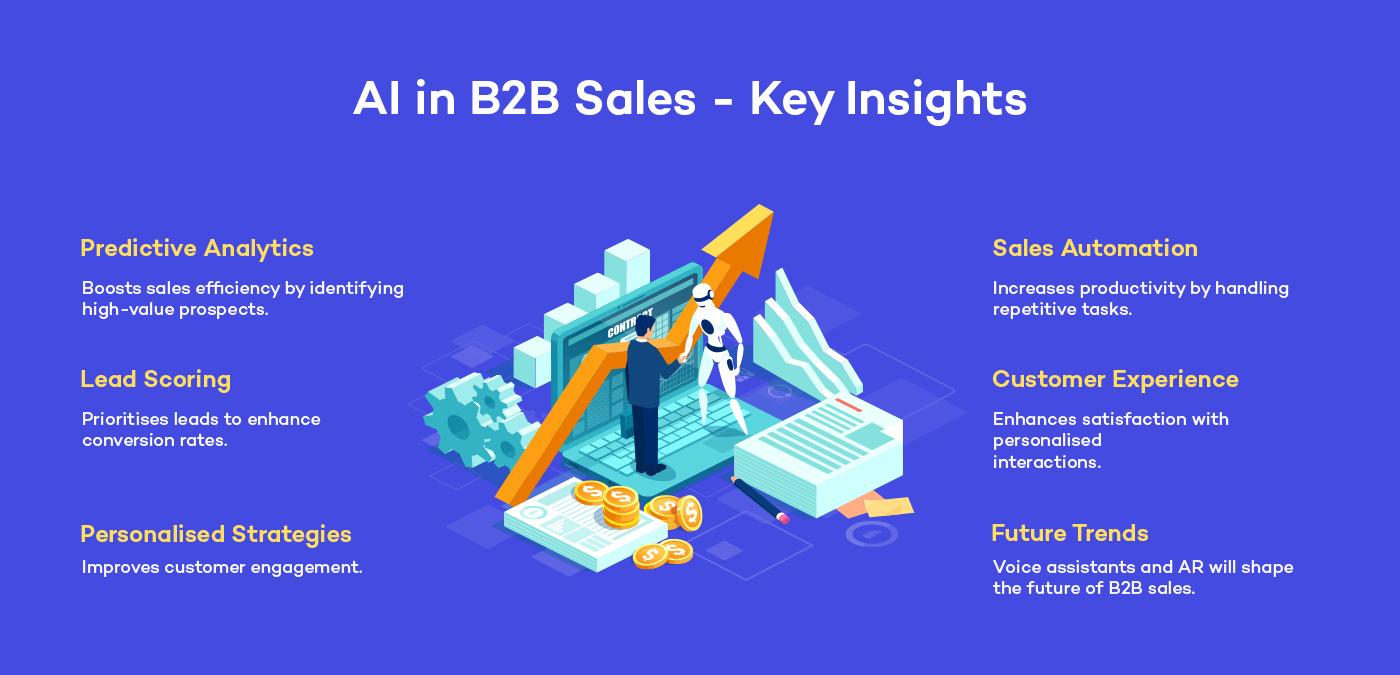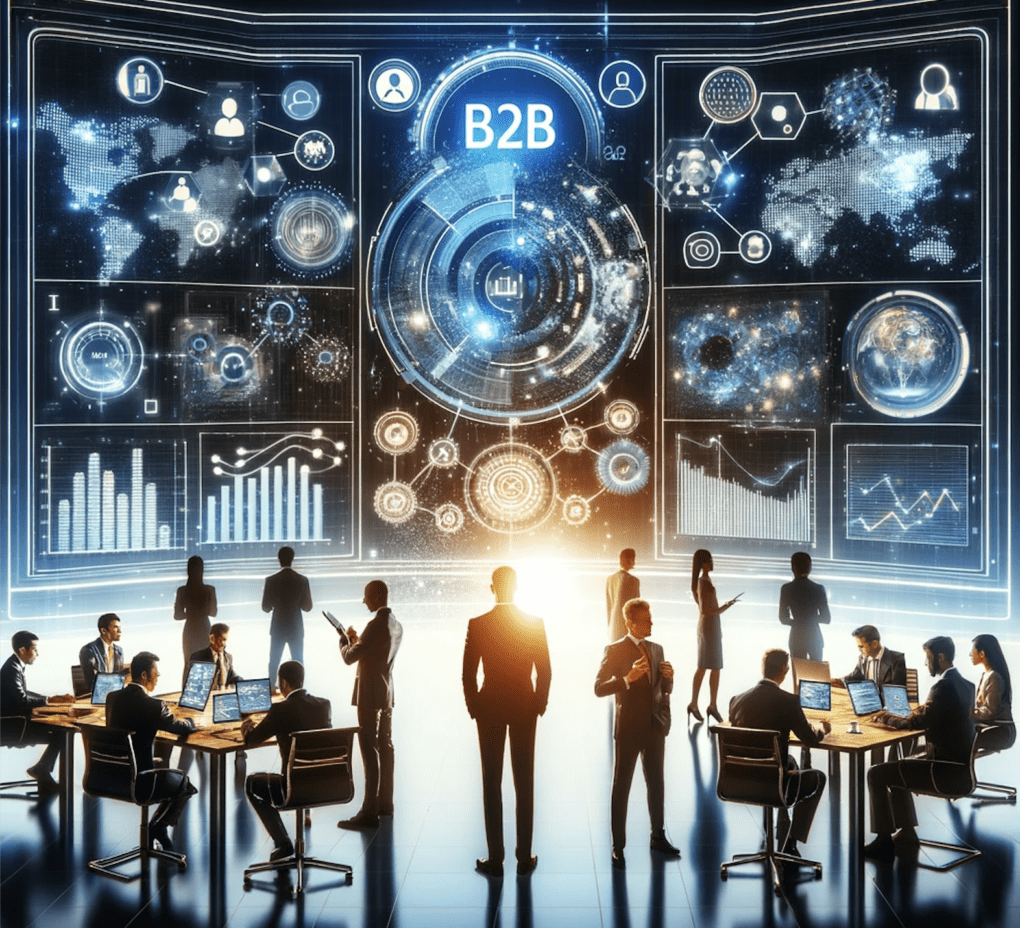Why Growth Systems For B2B is essential for B2B growth
Wiki Article
Open Efficiency and Growth With AI Automation for B2B Firms
AI automation is changing the landscape for B2B business. It streamlines operations and decreases reliance on human intervention. This change permits organizations to make quicker, data-driven choices. As companies discover which refines to automate, they need to likewise think about the right devices to execute. Obstacles stay in adopting AI modern technology. The ramifications of these adjustments might shape the future of many firms in means yet to be completely recognizedComprehending AI Automation in the B2B Context
As services progressively seek performance, understanding AI automation in the B2B context comes to be necessary. AI automation entails utilizing advanced modern technologies to enhance procedures, lower human intervention, and enhance decision-making procedures. In the B2B landscape, this can show up in numerous types, such as automating customer support communications, handling supply chain logistics, or optimizing marketing projects. Business can leverage AI to examine enormous datasets promptly, enabling them to determine trends and understandings that educate critical selections. Moreover, AI systems can incorporate flawlessly with existing innovations, offering a cohesive platform for taking care of company features. This understanding prepares for companies to discover just how AI can change their procedures, improve efficiency, and eventually foster lasting development in a competitive market.Secret Advantages of Applying AI Automation

Recognizing Procedures Suitable for Automation

Selecting the Right AI Devices for Your Business
When B2B firms take into consideration automating their processes, selecting the appropriate AI devices comes to be important for achieving wanted results. Firms should start by examining their distinct demands and goals, guaranteeing alignment with business objectives (Growth Systems For B2B). Reviewing the adaptability, assimilation, and scalability abilities of potential tools is critical, as these aspects determine long-lasting performance. Organizations should likewise take into consideration user-friendliness and the degree of support offered by suppliers, as these components can impact successful application. Additionally, analyzing customer evaluations and study can offer understandings right into exactly how specific AI remedies execute in real-world scenarios. By carefully picking AI tools that fit their operational requirements, B2B companies can enhance efficiency and drive growth while lessening possible disturbancesConquering Challenges in AI Adoption
B2B companies commonly run into substantial obstacles in embracing AI innovations, especially concerns connected to information high quality and resistance to change management. Poor information quality can hinder the efficiency of AI systems, while worker reluctance to embrace brand-new processes can delay implementation initiatives - Growth Systems For B2B. Attending to these challenges is important for successful AI combination and maximizing its possible benefitsInformation Quality Issues
Guaranteeing high information high quality is important for the effective adoption of AI modern technologies in business-to-business atmospheres. Incorrect, incomplete, or out-of-date data can badly impede AI campaigns, bring about incorrect understandings and bad decision-making. Companies often deal with challenges such as information silos, inconsistencies throughout different sources, and a lack of standard data styles. To overcome these problems, organizations have to purchase information cleansing, combination, and administration processes. Carrying out durable information administration practices assures that the details fed right into AI systems is trusted and appropriate. Fostering a culture of data high quality recognition amongst employees can boost data accuracy over time. By attending to information top quality problems, B2B firms can release the complete possibility of AI automation, driving performance and development.Change Administration Resistance

Determining the Influence of AI Automation
Measuring the effect of AI automation in B2B companies needs a clear understanding of vital performance signs (KPIs) that straighten with company goals. Reliable data analysis methods are essential for interpreting the results, while durable ROI analysis strategies help figure out the economic advantages of automation initiatives. Together, these components supply an extensive framework for assessing AI's contributions to organizational success.Secret Efficiency Indicators
Secret efficiency signs (KPIs) work as crucial tools for B2B business to analyze the effectiveness of AI automation initiatives. By developing clear metrics, companies can gauge improvements in operational efficiency, expense decrease, and earnings growth directly attributable to automation. Common KPIs consist of cycle time decrease, mistake rates, client fulfillment ratings, and worker performance degrees. These indications supply insights into exactly how AI systems are enhancing processes and boosting total performance. Additionally, tracking KPIs makes it possible for companies to recognize locations for more renovation and to line up AI automation efforts with strategic organization goals. Eventually, a well-defined structure of KPIs guarantees that B2B business can quantitatively evaluate the effect of AI automation on their operations and drive constant development.Information Analysis Methods
Efficient information evaluation techniques play an important duty in reviewing the influence of AI automation within B2B companies. By making use of statistical approaches, organizations can recognize patterns and patterns in functional information, enabling them to examine the effectiveness obtains accomplished through automation. Methods such as regression evaluation and time series projecting offer insights right into how AI-driven procedures affect efficiency and decision-making. In addition, data visualization devices can successfully communicate findings to stakeholders, facilitating notified strategic decisions. Artificial intelligence formulas can even more enhance analysis by forecasting future outcomes based upon historic information, providing actionable understandings. Inevitably, these techniques allow B2B firms to gauge success and optimize their AI automation initiatives, making sure placement with company goals and improving total efficiency.ROI Analysis Strategies
Assessing the return on financial investment (ROI) of AI automation is crucial for B2B business looking for to recognize the financial ramifications of their technical campaigns. Business can employ various ROI evaluation strategies to gauge the effectiveness of AI implementations - AI Automation For B2B. One effective approach involves calculating cost savings by contrasting functional expenditures prior to and after automation (Minarik AI). Furthermore, measuring performance renovations via article vital efficiency indicators (KPIs) aids evaluate the benefits of AI. Customer complete satisfaction metrics can likewise provide understandings into the impact of automation on solution high quality. To guarantee an extensive assessment, companies need to think about both direct intangible advantages and monetary returns, such as enhanced decision-making abilities and competitive advantage. This diverse evaluation makes it possible for B2B business to make enlightened decisions pertaining to future investments in AI innovationFuture Trends in AI Automation for B2B Business
What innovations exist in advance for AI automation in B2B companies? Arising trends indicate a considerable shift in the direction of enhanced data analytics capacities, enabling companies to make even more informed decisions. Anticipating analytics will certainly become progressively vital, allowing companies to expect market adjustments and client requirements. In addition, the assimilation of AI with Web of Things (IoT) innovation is anticipated to improve operations by supplying real-time insights and automation of procedures. Business will certainly additionally focus on boosting customer experiences with customized advertising and marketing driven by AI formulas. Moreover, developments in natural language processing will certainly facilitate better communication between clients and businesses. As these fads evolve, B2B companies must adapt to utilize AI automation properly, making certain continual development and competitive advantage.Frequently Asked Inquiries
What Industries Advantage one of the most From AI Automation in B2B?
Manufacturing, finance, medical care, and logistics markets benefit the most from AI automation in B2B. These fields utilize AI to enhance processes, boost decision-making, and improve overall functional effectiveness, driving significant development and advancement.Exactly How Does AI Automation Influence Worker Duties and Responsibilities?
AI automation improves worker roles and duties by enhancing repetitive jobs, enabling employees to concentrate on strategic efforts. This shift promotes skill growth, boosts productivity, and urges partnership, eventually driving business growth and technology.What Are Common Misunderstandings Concerning AI Automation in B2B?
Common false impressions about AI automation in B2B consist of fears of task loss, ideas that AI can completely change human judgment, and ignoring the relevance of collaboration between AI systems and staff members for optimal results.How Can Businesses Ensure Data Privacy With AI Automation?
Organizations can guarantee data privacy with AI automation by carrying out durable encryption protocols, adhering to regulatory compliance, conducting regular audits, and training employees on data dealing with practices to reduce risks and safeguard sensitive information.What Are the Costs Connected With Executing AI Automation?
The expenses connected with executing AI automation include software acquisition, framework upgrades, training employees, recurring upkeep, and prospective downtime during integration. In addition, companies may sustain costs associated with data protection and conformity steps.Measuring the impact of AI automation in B2B firms needs a clear understanding of key efficiency signs (KPIs) that align with organization purposes. Trick efficiency indications (KPIs) serve as important devices for B2B business to examine the efficiency of AI automation campaigns. Efficient data evaluation techniques play a crucial duty in reviewing the effect of AI automation within B2B firms. Assessing the return on financial investment (ROI) of AI automation is vital for B2B companies looking for to comprehend the economic ramifications of their technical initiatives. What technologies lie ahead for AI automation in B2B firms?
Report this wiki page